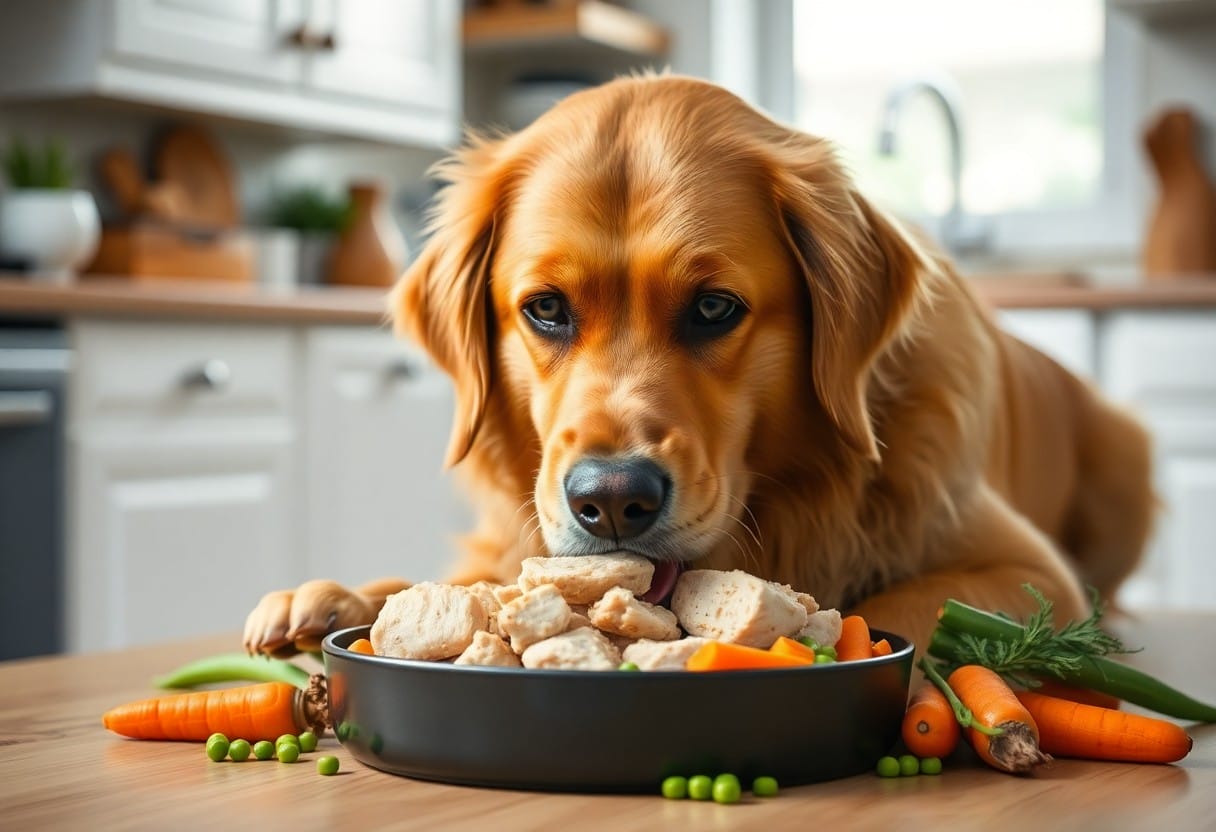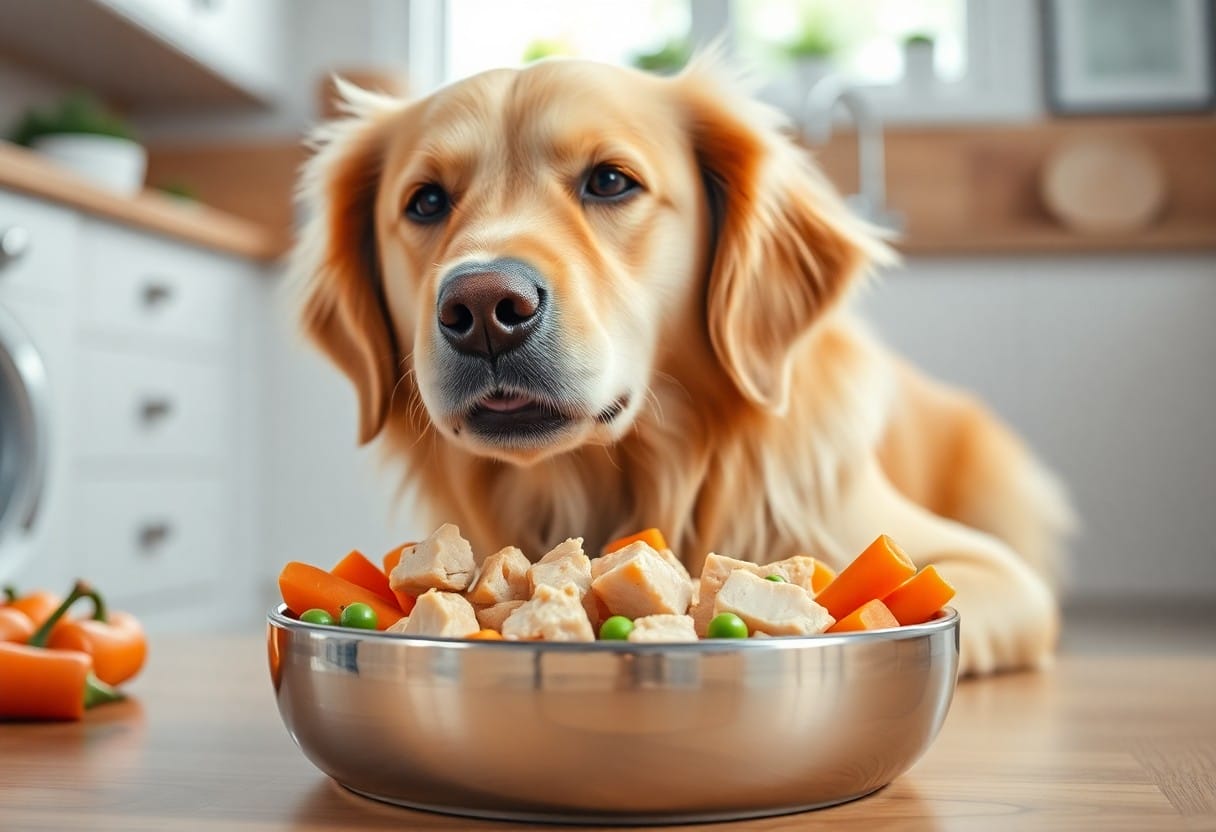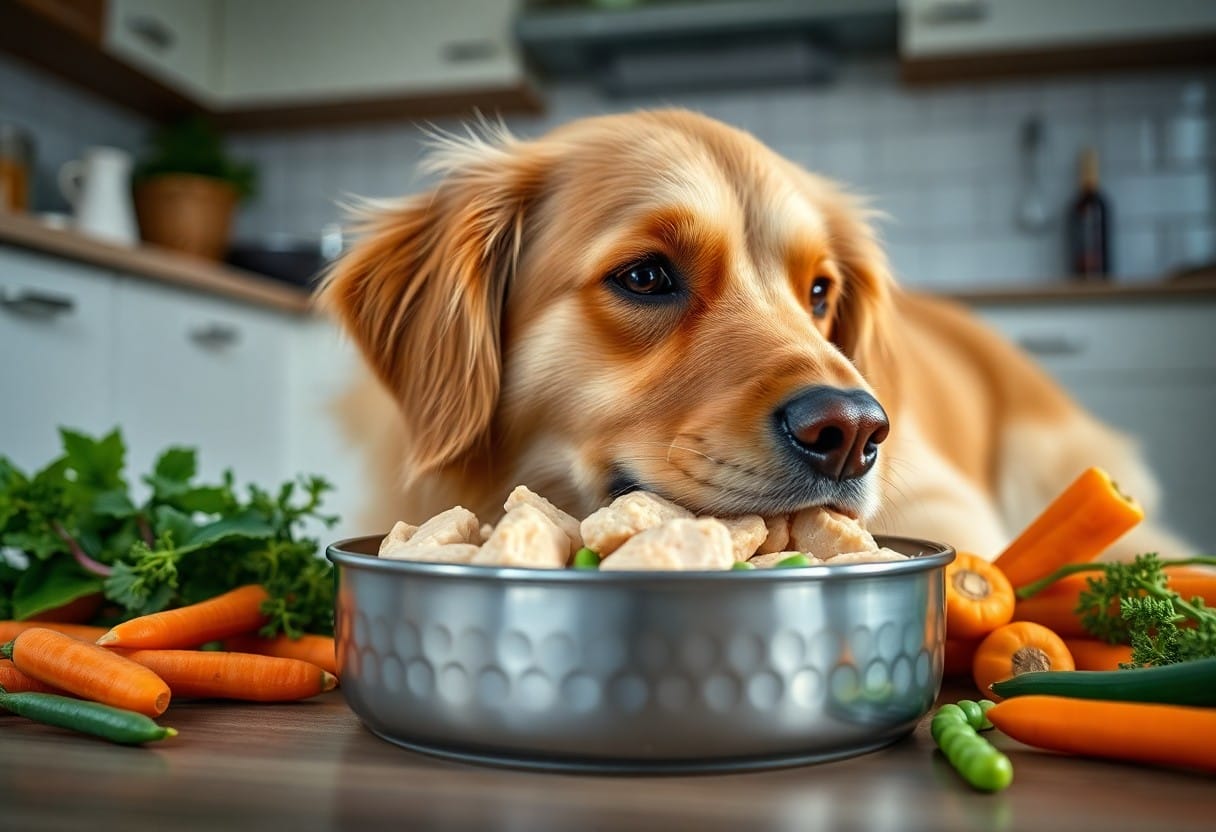
The Health Benefits of Adding Chicken to Your Dog's Diet
Share
As concerned dog owners, you want to provide your pet with the best possible nutrition. Adding chicken to your dog's diet can have significant benefits for their overall health, from improving digestion to reducing the risk of allergies and skin problems. By incorporating chicken into your dog's meals, you can help support their immune system and promote a healthier coat and shinier fur. You'll be taking a proactive step towards giving your dog a longer, healthier life.

Key Takeaways:
- Adding chicken to your dog's diet can provide a range of health benefits, including improved digestion and a reduced risk of allergies.
- Protein-rich chicken can help to support your dog's muscle growth and development, making it an ideal addition to the diet of puppies and active dogs.
- Incorporating chicken into your dog's meals can also provide necessary vitamins and minerals, such as niacin and phosphorus, which are vital for maintaining your dog's overall wellbeing.

Nutrition Benefits
To add chicken to your dog's diet, you should consider the nutritional advantages it provides. Chicken is a rich source of nutrients that can enhance your dog's overall health and wellbeing.
Protein Content
Along with being a lean protein, chicken helps to build and repair muscles in your dog, making it an excellent addition to their diet.
Essential Vitamins and Minerals
Nutritionally, chicken is a complete food that provides your dog with vital vitamins and minerals, such as niacin and phosphorus.
Further, when you add chicken to your dog's diet, you can be assured that they are getting a balanced mix of nutrients, including vitamin B6 and selenium, which are vital for maintaining healthy skin and coat. By incorporating chicken into your dog's meals, you can significantly improve their overall health and reduce the risk of certain health problems.
Health Advantages
You can notice significant improvements in your dog's overall health when you add chicken to their diet, including better digestion and reduced allergies, which can lead to a healthier and happier pet.
Improved Digestion
One of the key benefits of adding chicken to your dog's diet is the promotion of healthy digestion, as chicken is easily digestible and can help to soothe digestive issues.
Reduced Allergies
Beside the digestive benefits, chicken can also help to alleviate allergy symptoms in dogs, making it a great addition to their diet if they suffer from food allergies or sensitivities.
Reduced allergy symptoms can have a significant impact on your dog's quality of life, allowing them to thrive and enjoy their daily activities without the discomfort and distress caused by allergies, and with chicken as a part of their diet, you can help your dog to feel their best and live a healthy life.

Types of Chicken
Despite the various options, you can choose from organic or free-range chicken for your dog's diet. Consider the following:
- Chicken breast
- Chicken thighs
- Chicken liver
- Chicken wings
- Chicken necks
| Chicken Type | Nutritional Value |
|---|---|
| Organic | High in protein |
| Free-range | Rich in omega-3 |
| Chicken breast | Low in fat |
| Chicken thighs | High in iron |
| Chicken liver | Rich in vitamins |
Organic Chicken
Among the various types, organic chicken is a popular choice for your dog's diet, as it is free from hormones and antibiotics.
Free-Range Chicken
Beside the benefits of organic chicken, free-range chicken offers a more natural and healthy option for your dog.
Hence, when choosing free-range chicken for your dog, you should be aware of the potential risks of bacterial contamination and take necessary precautions to ensure your dog's safety and well-being, as a responsible and caring dog owner, you want the best for your pet, and free-range chicken can be a great addition to your dog's diet, but always consult with your veterinarian before making any changes.
Preparation Methods
Once again, you'll want to consider how to prepare chicken for your dog's diet. You can cook it or feed it raw, but proper handling and storage are imperative to prevent bacterial contamination.
Cooking Techniques
Among the various cooking methods, baking and boiling are the most suitable for chicken, as they help retain nutrients and make the meat easy to digest for your dog.
Raw Feeding
On the other hand, raw feeding requires extreme caution to avoid salmonella and E. coli contamination. You must handle the raw chicken safely and ensure your dog's overall health can tolerate a raw diet.
But when done correctly, raw feeding can provide numerous health benefits for your dog, including improved digestion and a shinier coat. You should consult with your veterinarian to determine if a raw diet is suitable for your dog and to discuss the best ways to introduce raw chicken into their diet.
Safety Precautions
Your dog's health is paramount, and when introducing chicken to their diet, it's imperative to consider potential risks. You must be aware of the possible hazards to ensure a safe and healthy experience for your pet.
Bacterial Risks
Guarding against bacterial contamination is vital when handling raw chicken. You should always handle chicken safely and cook it thoroughly to prevent salmonella and campylobacter infections, which can be harmful to your dog's health.
Allergic Reactions
Among the potential risks, allergic reactions to chicken are a concern. You should monitor your dog's behavior and watch for signs of itching, vomiting, or diarrhea, which can indicate an adverse reaction to chicken.
Also, if you notice any severe symptoms, such as difficulty breathing or swelling, you should seek immediate veterinary attention. Your veterinarian can help you identify the cause of the allergic reaction and suggest alternative protein sources for your dog's diet, ensuring their overall health and well-being.
Consultation and Guidance
Veterinary Advice
Across various veterinary clinics, you'll find that experts agree on the importance of tailored nutrition for your dog. As you consider adding chicken to your dog's diet, consulting a veterinarian is vital to ensure your dog's specific needs are met.
Customized Diets
Below the surface of a standard dog food recipe, you'll find that customized diets can offer significant health benefits for your dog. By working with your veterinarian, you can create a diet that addresses your dog's unique requirements.
A well-crafted customized diet can help alleviate food allergies and sensitivities, while also promoting optimal health and wellness. As you work with your veterinarian to develop a customized diet, you'll be able to monitor your dog's progress and make adjustments as needed to ensure they're thriving on their new diet, which can lead to improved digestion, increased energy, and a healthier coat.
Summing up
On the whole, adding chicken to your dog's diet can have a significant impact on their overall health. You will likely notice improvements in your dog's digestive health and immune system. As you consider making this change, you can feel confident that you are providing your dog with a nutrient-rich protein source that can lead to a happier, healthier life for your pet.
Frequently Asked Questions
What are the health benefits of adding chicken to my dog's diet?
A: Adding chicken to your dog's diet can provide numerous health benefits. Chicken is a rich source of protein, which is important for maintaining healthy muscles, skin, and coat. It is also a good source of vitamins and minerals such as niacin, vitamin B6, and selenium, which can help to boost your dog's immune system and overall health. Additionally, chicken contains glucosamine and chondroitin, which can help to support joint health and reduce the risk of arthritis.
Can I give my dog cooked or raw chicken, and what's the difference?
A: Both cooked and raw chicken can be given to dogs, but it's generally recommended to cook the chicken to kill any potential bacteria such as Salmonella. Cooking chicken can also make it easier to digest for dogs with sensitive stomachs. Raw chicken, on the other hand, can provide more nutrients, but it's important to handle it safely and source it from a reputable supplier to minimize the risk of contamination. Ultimately, the decision to give cooked or raw chicken should be based on your dog's individual needs and health status, and it's always best to consult with a veterinarian.
How much chicken should I add to my dog's diet, and how often?
A: The amount of chicken to add to your dog's diet depends on various factors, including the size, age, and breed of your dog, as well as their individual nutritional needs. As a general rule, chicken should not make up more than 10-15% of your dog's daily calorie intake. It's also important to introduce chicken gradually to prevent digestive upset, starting with small amounts (about 1-2 teaspoons per 10 pounds of body weight) and gradually increasing the amount over time. You can add chicken to your dog's meals 2-3 times a week, but it's always best to consult with a veterinarian to determine the best feeding schedule for your dog.
Can dogs with food allergies or sensitivities eat chicken, and are there any alternatives?
A: While chicken is a common ingredient in many dog foods, some dogs may develop allergies or sensitivities to it. If your dog has a chicken allergy or sensitivity, it's important to avoid giving them chicken altogether. There are, however, alternative protein sources such as turkey, fish, or lamb that can provide similar nutritional benefits. It's always best to consult with a veterinarian to determine the best diet for your dog, especially if they have a history of food allergies or sensitivities.
Are there any potential risks or side effects of adding chicken to my dog's diet?
A: While chicken can provide numerous health benefits, there are potential risks and side effects to be aware of. For example, giving your dog too much chicken can lead to an imbalance of nutrients, particularly if it's not balanced with other important ingredients. Additionally, chicken bones can be a choking hazard or cause intestinal blockages if not digested properly. It's also important to handle chicken safely to minimize the risk of contamination and foodborne illnesses. Always consult with a veterinarian before making any significant changes to your dog's diet, and monitor their health closely to ensure they're tolerating the addition of chicken well.
